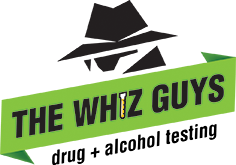Breath Alcohol Testing
The Whiz Guys are Certified Alcohol Screening Professionals (CASP), Alcohol Screening Test Technicians (STT), and Breath Alcohol Technicians (BAT). They are certified to perform Evidential Breath (Alcohol) Tests (EBT). The Whiz Guys are certified to follow the proper collection and control procedures. They have the proper paperwork, testing equipment, and testing protocol to ensure safe and accurate alcohol tests. Doc Mike and Doc Jake are certified in using the EV30 Lifeloc Evidential Breath (Alcohol) Testing (EBT) device. Alcohol tests are performed for pre-employment, random, return to duty, reasonable suspicion, follow-up and post-accident.
Companies are required by the FMCSA to declare a Designated Employee Representative (DER). The Whiz Guys can train or refer your DER to a training facility in order to make your company compliant with FMCSA guidelines. The Whiz Guys take their job very seriously and follow guidelines set forth by the Department of Transportation (DOT) and Federal Motor Carrier’s Safety Administration (FMCSA). The Whiz Guys are open for accepting new accounts and welcomes you to call and set up an account for your business today!
The Whiz Guys offer the service of being a Consortium/Third Party Administrator (CTPA) for your company. This means they provide your company with an initial pre-employment/baseline alcohol screen followed by random alcohol testing services. The Whiz Guys follow the guidelines set forth by the FMCSA which requires 10% of employees have random testing yearly. They enter your employees into a pool and use scientific program (randomizer) to make selections for random testing. The Whiz Guys contact your DER to schedule the random alcohol test.
In cases that involve post-accident drug and alcohol testing, The Whiz Guys offer after hours and on-site services. Drivers are required to have an EBT by a BAT following a motor vehicle accident. If post-accident testing is needed, a BAT will conduct the test and a print out of positive or negative alcohol test with date and time will be provided immediately following the test.
Who is subject to DOT Drug and Alcohol Testing?
Anyone designated in DOT regulations as a safety-sensitive employee is subject to DOT drug & alcohol testing. What follows is an overview of what jobs are defined as safety-sensitive functions subject to testing.
Aviation (FAA)
Flight crews, flight attendants, flight instructors, air traffic controllers at facilities not operated by the FAA or under contract to the U.S. military, aircraft dispatchers, aircraft maintenance or preventative maintenance personnel, ground security coordinators and aviation screeners. Direct or contract employees of 14 CFR Part 121 or 135 certificate holders, Section 91.147 operators and air traffic control facilities not operated by the FAA or under contract to the US Military. See FAA regulations at 14 CFR Part 120.
Commercial Motor Carriers (FMCSA)
Commercial Drivers License (CDL) holders who operate Commercial Motor Vehicles, 26,001 lbs. gvwr. or greater, or operate a vehicle that carries 16 passengers or more including the driver, or required to display a DOT placard in the transportation of hazardous material. In some instances, states allow waivers from this qualification, such as operators of fire trucks and some farm equipment. Check with your state department of motor vehicles for more information. See FMCSA regulation at 49 CFR Part 382.
Maritime (USCG)
An agency of the U.S. Department of Homeland Security. Crewmembers operating a commercial vessel. See USCG regulations at 46 CFR Parts 4 & 16.
Pipeline (PHMSA)
Operations, maintenance and emergency response. See PHMSA regulations at 49 CFR Part 199.
Railroad (FRA)
Hours of Service Act personnel, engine & train, signal service or train dispatchers. See FRA regulations at 49 CFR Part 219.
Transit (FTA)
Vehicle operators, controllers, mechanics and armed security. See FTA regulations at 49 CFR Part 655.
Links to these regulations can be found at:
https://www.transportation.gov/odapcRemember:
The tasks you actually perform qualify you as a safety-sensitive employee, not your job title. Also, some employees, like managers and supervisors, may be qualified for these jobs but not currently performing them. Do they have to be tested as well? In most cases, yes...if that employee may be asked at a moment’s notice or in an emergency to perform a safety-sensitive job. Be sure to check industry specific regulations for further clarification.
Additional information can be found at:
http://www.fmcsa.dot.gov/regulations/drug-alcohol-testing/overview-drug-and-alcohol-rules2024 DOT Random Testing Rates
The following chart outlines the annual minimum drug and alcohol random testing rates established within DOT Agencies and the USCG for 2024.
NOTE: Employers (and C/TPAs) subject to more than one DOT Agency drug and alcohol testing rule may continue to combine covered employees into a single random selection pool. However, companies (and C/TPAs) doing so must test at or above the highest minimum annual random testing rates established by the DOT Agencies under whose jurisdiction they fall. For example, an employer having both FMCSA- and FRA-covered employees in one pool must test, as a minimum rate, 50% for drugs and 10% for alcohol. PHMSA- and USCG-regulated employees should not to be placed in DOT random alcohol testing pools. Contact the appropriate DOT Agency for additional clarification.
[Please note that USCG covered employees may be combined with DOT covered employees in drug testing pools even though the USCG is now part of the Department of Homeland Security.]